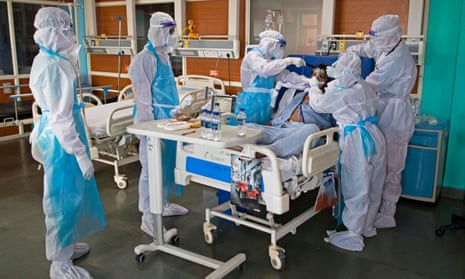The largest ever international study of people with long Covid has identified more than 200 symptoms and prompted researchers to call for a national screening programme.
The study found the myriad symptoms of long Covid – from brain fog and hallucinations to tremors and tinnitus – spanned 10 of the body’s organ systems, and a third of the symptoms continued to affect patients for at least six months.
A national screening programme would help produce a better understanding of how many people are affected and the kind of support they would need, the researchers said.
The researchers also called for the clinical guidelines for assessing patients with suspected long Covid to be widened beyond cardiovascular and lung-function tests.
Athena Akrami, a neuroscientist at University College London, and senior author of the study, said: “A lot of post-Covid clinics in the UK have focused on respiratory rehabilitation. It’s true that a lot of people have shortness of breath, but they also have a lot of other problems and types of symptoms that the clinics need to provide a more holistic approach to.”
She said that she was still experiencing symptoms 16 months after becoming infected with coronavirus, adding: “There are likely to be tens of thousands of long Covid patients suffering in silence, unsure that their symptoms are connected to Covid-19.
“Building on the network of long Covid clinics, which take GP referrals, we now believe a national programme could be rolled out into communities able to screen, diagnose and treat all those suspected of having long Covid symptoms.”
The study, published in the Lancet’s journal EClinicalMedicine, surveyed 3,762 people with confirmed or suspected long Covid from 56 countries. It identified 203 symptoms, of which 66 were tracked for seven months.
The most common symptoms were fatigue, post-exertional malaise (where people’s health worsens after physical or mental exertion) and brain fog. Other effects included visual hallucinations, tremors, itchy skin, changes to the menstrual cycle, sexual dysfunction, heart palpitations, bladder control issues, shingles, memory loss, blurred vision, diarrhoea and tinnitus.
The researchers also captured the progression of symptoms over time. “After six months most of the remaining symptoms are systemic – things like temperature regulation, fatigue, post-exertional malaise – and neurological [affecting the brain, spinal cord and nerves],” Akrami said.
Respondents with symptoms lasting longer than six months, a total of 2,454, said they experienced an average of 13.8 symptoms during the seventh month.
Across the course of their illness, patients’ symptoms affected nine organ systems on average. “This is important for medical researchers who are looking for the underlying [disease mechanisms], and also for doctors that provide care and treatment because it suggests they should not just be focusing on one organ system,” said Akrami.
About 22% of the people who participated in the survey reported not being able to work – being fired, taking prolonged sick or disability leave, or quitting – due to their illness. And 45% required a reduced work schedule.
Meanwhile, a review led by researchers at the University of Birmingham and published in the Journal of the Royal Society of Medicine, found that those who experienced more than five symptoms of Covid-19 during the first week of infection were at significantly greater risk of developing long Covid, irrespective of age or gender.
Separate research flagged the substantial strains that could be placed on health and social care systems in the coming years, as a result of Covid-related complications that occurred during the acute phase of illness among those patients who were admitted to hospital. It found that half of those hospitalised with Covid-19 developed at least one additional complication during their stay, while a quarter of patients were less able to look after themselves when they were discharged from hospital than before they had the virus. This impact on self-care was even higher among those with neurological complications such as strokes or meningitis.
“Being admitted to hospital with breathing problems is not a complication in itself, the complication is if they get a pneumonia on top of that, or a blood clot or an acute kidney injury,” said Dr Annemarie Docherty, an honorary consultant in critical care at the University of Edinburgh, who was involved in the study.
The study, which was published in The Lancet and involved more than 70,000 people in 302 UK hospitals, found that the most common complication was sudden damage to the kidneys causing them to not work properly. This affected one in four of those admitted to hospital with severe Covid. It was followed by lung complications, such as pneumonia or severe inflammation of the lungs, which affected around one in five patients; and heart complications, such as heart attack, inflammation around the heart or an abnormal heart rhythm, which affected just over one in eight (12%).
Although men and over-60s were most commonly affected, 27% of 19- to 29-year-olds and 37% of 30- to 39-year-olds who were admitted to hospital also experienced at least one complication.
“I was actually really quite surprised, because I was expecting the same relationship that we see with death – in other words, that the complications would [primarily affect] the frail and elderly people,” said Prof Calum Semple at the University of Liverpool, the study’s chief investigator. “I was really quite distraught to see that we were talking about young people, who were previously fit and well, having complications such as an acute kidney injury.”
He warned that policymakers must consider the risk of complications for Covid survivors, not just deaths, when making decisions around easing restrictions. For instance, someone with an acute kidney injury will require ongoing monitoring and may require kidney dialysis or transplantation. They could also be at increased risk of cardiovascular disease and osteoporosis in later life because their kidneys are no longer properly regulating their blood pressure and bone minerals.










